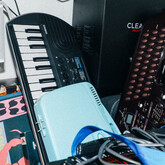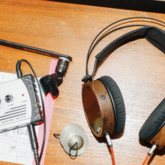Lina suggested that we meet at Moderna Museet, Stockholm's museum of modern art on Skeppsholmen, the idea being that Skeppsholmen's autumnal leaves could act as a backdrop in the photos for the interview. It's also a suitable location to discuss origins and creativity with the daughter of two artists.
"My mom studied at Stockholm's Royal Academy of Fine Arts, so I was often here at Moderna Museet as a child."
Lina leads us confidently through the maze of corridors to a place where we can speak undisturbed.
"Just as my own daughter has been to more jazz concerts than average, I went to art exhibitions, but I still think this is the best."
Moderna Museet?
"No, getting coffee and cake!"
We've arrived at the museum's coffee shop. We buy coffee and cake and grab a corner table.
I've read that you wish you grew up in a musical family?
"That was probably something I said when I had my daughter. I suddenly realized that she, at five years old, knew so much about music that I didn't learn until I was a teenager."
The fact that both of Lina's parents were visual artists is a legacy that she's infused into her music. In preparation for new projects, she often uses vision boards, cutting and pasting photos and colors to gather inspiration. She uses visual aspects to create a context for musical aspects.
"I inherited imagery on a general, underlying plane and picked up things like perspective drawing along the way. I use mental imagery a lot when composing."
"I'm always involved in the covers for my records and I have very clear ideas about how they should look. Sometimes the covers are finished before the music. Then I know how the music should be and can get to work on it."
Back when music was handwritten, Lina's background surfaced in her fascination for musical notes as symbols and for the special handwriting style used to score music. Today, however, she uses a computer for such things.
"My creative process most often entails me sitting and improvising on piano or guitar, singing, and recording it on my cell phone. Sometimes I compose directly on a computer, but it's better if I sit at the piano first and then arrange the music on a computer."
From writing fancy G-clefs in lined composition notebooks to composing music with a smartphone. A lot can happen in 25 years.
You're celebrating 25 years as an artist this year. How do you plan to celebrate?
"Oh, I completely overlooked that. When I celebrated 20 years as an artist, I had an anniversary concert. I started touring quite young, at about 18 or 19. That concert was a way of saying to myself – and in front of others – that I've been doing this a while now and know what I'm doing. We'll have to see if I come up with anything this year."
And how do you survive for 25 years as a jazz musician in Sweden?
"You have to be extremely willing to take financial risks. As my parents were artists, I grew up around a form of cultural expression that was, if possible, even more difficult to live on. For me, becoming a jazz musician was a step up."
"My mom successfully raised me and my sister for many years as a visual artist and a single parent. That creates a sense of security that things will work themselves out. I think it's more difficult for musicians who come from families with regular nine-to-five jobs. They're maybe pressured from home, 'How are you going to earn a living? That seems impossible.' "
So you've never felt like giving it all up and becoming an engineer instead?
"No, but periodically I've worked in teaching to make ends meet, at the music schools in both Gothenburg and Stockholm. As of seven years ago, I receive an artist's stipend of about 12,000 dollars a year after tax, from the Swedish Arts Grants Committee. That makes a huge difference."
On the whole, Lina explains, it's such stipends and second jobs that make ends meet for Swedish jazz musicians. Very few can make a living from record sales and touring.
"STIM royalties help as well, of course, if you write your own music."
Over the past ten years, Swedish politicians' greater interest in Eurodance and pop bands such as Da Buzz than jazz hasn't made things any easier.
"The problem is that the money earmarked for independent music has stayed at the same level while everything else has moved in another direction. I get the same cultural grant for my band from the Swedish Arts Council today as I did 20 years ago. They need to seriously increase the money earmarked for the independent music scene, organizers and musical groups."
Applying for cultural grants has become an established piece of the puzzle when Lina chooses new projects.
"When I have an idea for a context or some musicians I'd like to work with, I contact them to see if they want to get involved. That gives you a foundation. Then you apply for grants so that you can pay the musicians."
Unlike when classical music composers write commissioned works, Lina almost only writes pieces in which she performs and sings.
"I mostly write for myself. Although some of my recent commissioned pieces for Norrbotten Big Band are actually instrumental. Singing and leading an orchestra at the same time demands a great deal of concentration, so a short break can be nice."
You're a singer, a composer, and a lyricist. I think you're like a singer-songwriter, but with a jazz band instead of a solo guitar.
"Yes, I'm a little unusual. I've tried to find another female singer who writes for big bands, but I haven't had any luck. I'd like to see a picture of someone singing while leading a big band so that I can see how they do it. You can't have your back to the audience while singing and conducting."
In 2006, Lina and jazz singer/composer Gunilla Törnfeldt founded the Impra network, which works to better promote women working in musical improvisation by highlighting role models and fellow musicians.
"Of course I knew that I had colleagues who weren't male, but I seldom met them. In the end, it started to feel strange. As soon as you were interviewed, it'd be: how does it feel to be the only woman among so many men?"
Equality has come a long way since Impra was founded. The network now runs two clubs – one in Gothenburg and one in Stockholm – that work practically with norm criticism and equality when music programs are put together.
"I think we've made a big difference in the jazz and improvisation scene, not least by raising the issue in the first place and being there to point out when something has been unfair."
One clear example of how times have changed is how the prestigious Swedish Jazzkatten awards, founded in 1993, have developed.
"I was the first woman to win the Musician of the Year award (2011), and that felt strange. Many people have misunderstood when I've tried to explain this. Yes, I was extremely pleased to receive the award, but it was also about ten years too late. My colleagues and others who I've written music for received their awards ten years earlier."
"Many people got upset last time I talked about this. And I understand, most people feel unfairly treated at times, especially as jazz musicians. It's difficult to make ends meet. In that respect, I've been very lucky – I've been able to support myself and received a great deal of attention and grants, so I should probably sit down and keep quiet."
"The underlying problem with the Jazzkatten awards was that there were almost only ever men on the jury, only male nominees and only male winners," Lina explains. "That structure has improved."
"It was bizarre considering how many active female jazz musicians there are. Rigmor Gustafsson and Karin Hammar still haven't received any awards."
This year, Lina is nominated in the Jazzkatten awards again, for Composer of the Year, and she has no mixed feelings should she win.
"It's great to be nominated because I've worked so hard at writing music in recent years. It's been difficult to talk about these things, but I'm not afraid to stick my neck out. I think things are different now, both men and women are nominated today."
Lina on…
…composing the official jingle for Swedish Radio's P2 station:
"That was a very grand assignment and it was very exciting to write music for a symphony orchestra. They asked for ten to fifteen outlines from different composers and listened to them without knowing who had written what, and they chose me. It's played for about a minute each day and doesn't pay much in royalties – if you want to make the big bucks you have to write for TV."
… her latest record, The Sirenades, which she recorded together with Norrbotten Big Band:
"They'd commissioned twenty minutes of music from me and I didn't want to write music for a big band without recording it as well. Parallel to this, I was writing music for my four-piece band, so it became a double album."
… STIM:
"I've been a bit critical of STIM regarding how they negotiated with Spotify – I think the royalties are extremely low. Otherwise, I don't have any problems with STIM. It seems like many young people don't realize that they have to report live performances to STIM, and that's a shame because they can add up to a lot of money. But I really like STIM."
… her unreleased work:
"I wrote some film music when I was at the Royal College of Music in Stockholm and we collaborated with Stockholm's University College of Film, Radio, Television, and Theater. That was a long time ago, so it'd be fun to hear it again."
Works registered with STIM:189
First registered work:
Nothing New
Most performed works:
I'm Invisible
For the Lonely Ones
Under träden
Follow Me
This Is the Way Life Goes
Five favorites on Lina's smartphone:
Elis & Tom (album) by Elis Regina and Antonio Carlos Jobim
Escalator Over the Hill by Carla Bley and Paul Haines
Relâche (ballet) by Erik Satie
Anything by Cathy Berberian
Sing to the Moon by Laura Mvula


